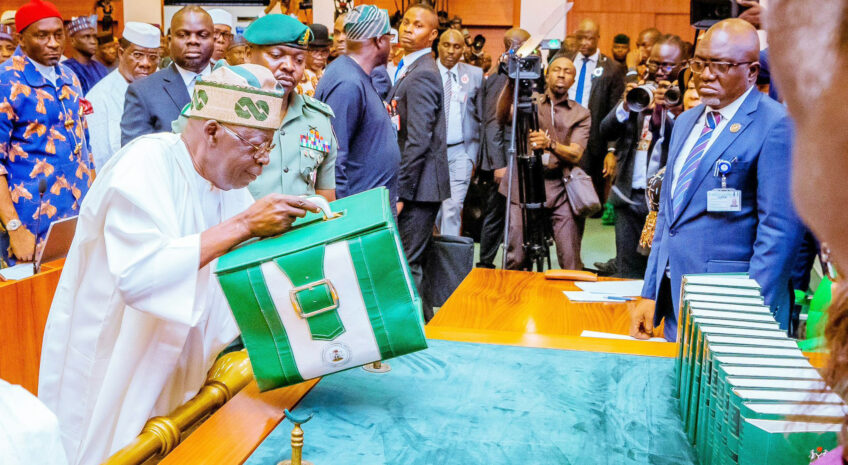
Given the dicey state of the country’s finance, the 2024 federal budget would certainly follow the deficit budgeting pattern, making it imperative for the Federal Government to embrace ingenuity in managing the challenges that will naturally present themselves in the circumstances. It is perhaps an understatement that the state of the country’s public finance is currently dicey.
Notwithstanding the various policy pronouncements by the Bola Tinubu administration since it came into office on May 29, 2023, the country is still running unsustainable deficit budgets and thus battling with the sorry situation. This is particularly so, given the various local and global uncertainties surrounding the inflow of new revenues and the management of the expenditure profile.
These indicators suggest that the 2024 federal budget would certainly follow the deficit budgeting pattern. In fact, the deficit for 2024 may actually even be worse than for previous budgets. Hence there are impending hurdles the government must overcome to ensure efficient management of its budget in 2024.
The fiscal deficit actually ballooned under the watch of President Muhammadu Buhari from about N80 billion in 2015 to a whopping N9.3 trillion in 2022. In fact, the past administration took the country on this unholy path to Golgotha and thus set the pace for the lingering fiscal challenge the country is currently going through. Each year, under Buhari, the actual deficit exceeded the projected sum, in some years over 50 per cent. Under that administration, for eight-years, the plugging of the budget gap relied almost 100 per cent on borrowing. This included the continual resort to the Central Bank of Nigeria’s (CBN) overdraft for support such that from May 2015, when the administration assumed leadership, the value of CBN’s overdraft grew from N790 billion to N23.3 trillion as at December 2022 – an expansion of 2,850 per cent.
Actually, that rising tempo of deficit is what has made the implementation of the 2023 budget a major challenge to the Tinubu administration. This also set the pace for the recent supplementary budget put forward and approved under the watch of President Tinubu. The unpleasant part of the entire fiscal imbroglio is that both the Buhari and Tinubu administrations are products of the same political party –the All Progressives Congress which has been in power since 2015 after the ouster of the Goodluck Jonathan Administration of the Peoples Democratic Party. This seeming lack of intra-party cohesion is telling on the fiscal fortunes of the nation and the repercussions may be manifest in 2024 and even beyond. The main narrative of the Buhari administration has been that Nigeria has a revenue problem which many stakeholders find difficult to accept.
The lack of the sense of austerity in both the Buhari and Tinubu administration has been seen by many as being at the core of the country’s fiscal challenge. Lack of focus on addressing the burgeoning cost of governance by both administrations will continue to be an albatross in the quest for solution to the country’s fiscal challenge.
Though efforts are being made to increase the inflow of more revenues into government coffers, the Tinubu administration should be cautious in overtaxing the working class and avoid as much as possible incidents of multiple taxation so as to enhance consumer disposable incomes in the enhancement of aggregate demand and increased domestic production. Though the Tinubu administration recognises the importance of using taxation to stimulate growth, as exemplified by the inauguration of the Presidential Fiscal Policy and Tax Reforms Committee, under Mr. Taiwo Oyedele, it needs to acknowledge fully the negative implications of overtaxing the populace. Many people are currently going through some economic straits and a further diminishing of their economic fortunes is the last thing they would be amenable to.
The Oyedele-led committee on its own part should live true to its focus and thus not just be concerned about raising tax revenue but on creating an efficient fiscal space to assist government address the looming fiscal challenge. The quest by the new Executive Chairman of the Federal Inland Revenue Service Mr Zaccheus Adedeji, to raise the tax-to-GDP ratio to 18 per cent in the next few years from the current 10 per cent and above the African average ratio of about 16 per cent should be handled with caution.
The 2024 budget and its implementation are expected to be challenging for the Tinubu administration. The government needs to carry the people along by imbibing some sense of austerity in its operations, increasing revenues through taxation cautiously as well as ensuring that unbridled borrowing are curtailed either through the CBN or by other sources. The Legislature would need to work closely with the Executive in the surmounting of this unavoidable fiscal challenge.






